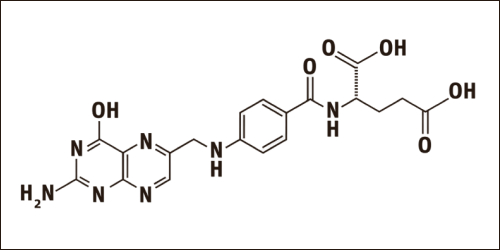Vitamin B9
Folate
Year of discovery: 1941 | Henry Mitchell
Folate includes forms of this vitamin found naturally in nature (pteroylglutamic acid) and forms found in fortified foods and supplements (folic acid). Folic acid is the most stable form of folate. Folic acid acts primarily as a THF (tetrahydrofolate) coenzyme, which carries one-carbon compounds for DNA synthesis and repair, and is involved in energy and amino acid metabolism. Folate and vitamin B12 are interconnected in their ability to transfer and take up these one-carbon compounds, called methyl groups. For example, THF with a methyl group transfers its carbon compound to vitamin B12. This action converts vitamin B12 into an active coenzyme, which in turn catalyzes the conversion of homocysteine to methionine. Without vitamin B12, folate in its methyl form becomes trapped in cells and remains unavailable for cell growth. Folic acid is essential for brain development and function.
Main sources of folic acid
Dark green leafy vegetables, beans, lentils, asparagus, wheat germ, yeast, peanuts, oranges, strawberries.
Bioavailability of folic acid
Folic acid from supplements is 100% bioavailable when taken without food and its bioavailability is 85% when taken with food. Naturally occurring folate in food is 50% bioavailable, with naturally occurring forms being highly unstable. Folic acid is rapidly destroyed by heat and oxygen.
Risks associated with insufficient folic acid intake
People on a diet that lacks sufficient quantity and variety of green leafy vegetables and legumes are at risk of insufficient folic acid intake. The need for folic acid increases during pregnancy, especially in the first few weeks of pregnancy. Folic acid deficiency is strongly associated with the risk of neural tube defects in the developing fetus. Therefore, it is recommended that women of childbearing age and pregnant women meet their folic acid needs with a combination of natural foods (folate in its natural form) and foods fortified with it or supplements (folic acid). In many Western countries, governments have mandated that flour be enriched with folic acid. Folic acid is crucial for cell growth and repair, especially for short-lived cells such as those in the mouth and gastrointestinal tract. Visible signs of folic acid deficiency include digestive problems. Other symptoms include fatigue, loss of appetite, lower red blood cell count and red blood cells of larger size (megaloblastic or macrocytic anemia), and neurological problems. Vitamin B12 deficiency will cause folic acid deficiency because vitamin B12 will not be available to transfer its methyl group to convert folate into its active form.




